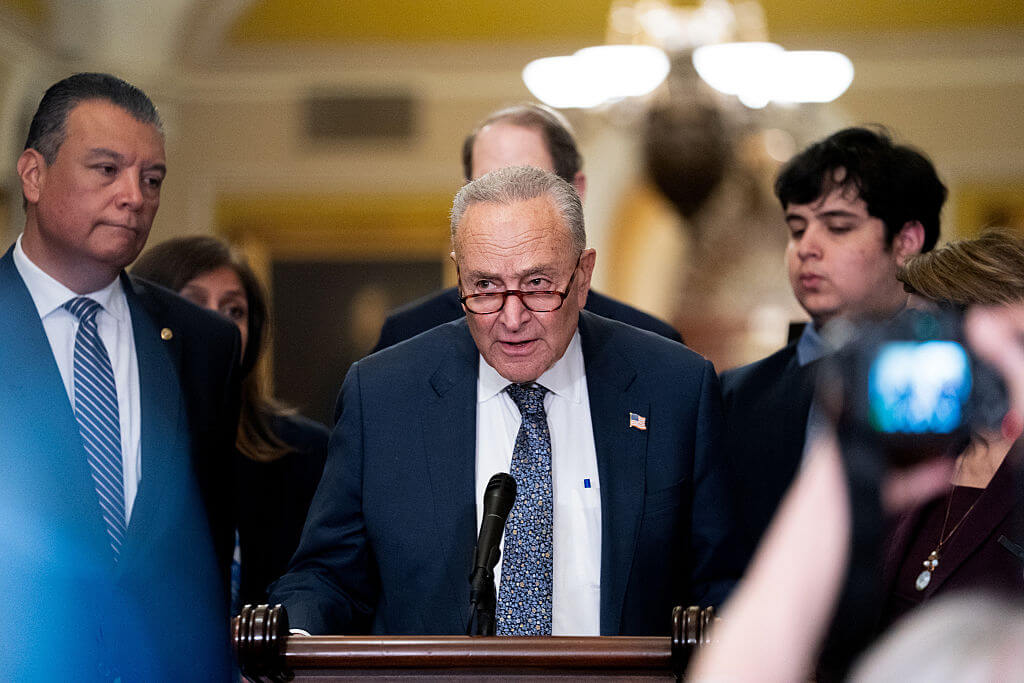Schumer, highest-ranking Jewish official, slams Trump over Iran strike — but leaves his own position unclear
Senate Minority Leader Chuck Schumer decried the process, exposing congressional rift on confronting Iran

Senate Minority Leader Chuck Schumer on June 17. Photo by Allison Robbert/Bloomberg via Getty Images
Reactions to President Donald Trump’s surprise strike on Iranian nuclear facilities Saturday ranged from cautious support to deep concern over the president acting without congressional approval.
But it was Senate Minority Leader Chuck Schumer — long a hawk on Iran and the highest-ranking Jewish official in the the U.S. — who drew the most attention: He blasted Trump for sidestepping Congress, yet stopped short of saying whether he supported the strike itself.
“No president should be allowed to unilaterally march this nation into something as consequential as war with erratic threats and no strategy,” Schumer said. He added that with the risk of a “more devastating war” now significantly heightened, the Senate must vote on a resolution under the War Powers Act, a law passed in 1973 that limits the president’s ability to deploy U.S. forces without congressional approval and requires notifying Congress within 48 hours of military action.
President Trump “has impulsively risked launching a war that may ensnare us for generations,” Rep. Alexandria Ocasio-Cortez, Democrat of New York, posted to social media after the attack. “It is absolutely and clearly grounds for impeachment.”
Democratic pushback is unlikely to succeed. The Republican leadership was notified ahead of time, and Vice President JD Vance and Secretary of State Marco Rubio both maintained that the strike was a one-time operation and not a declaration of war against Iran. White House Press Secretary Karoline Leavitt claimed that Schumer was contacted before the strikes and that Jeffries was reached while the mission was underway.
Named “Midnight Hammer,” the mission took 25 minutes, said Gen. Dan Caine, chairman of the Joint Chiefs of Staff. “This operation was designed to severely degrade Iran’s nuclear weapons infrastructure,” he said. More than 125 U.S. planes participated in the attack.
The New York Times reported Sunday that the Fordo underground site was severely damaged, but not entirely destroyed. Trump raised the possibility of the U.S. pushing for regime change in Iran in a post on his social media platform, Truth Social.
Where Democrats stand on confronting Iran
Schumer’s statement was more specific than that of Rep. Hakeem Jeffries, the Democratic leader in the House. Jeffries accused Trump of misleading the public and bypassing Congress, but stopped short of outlining any concrete action beyond requesting a classified briefing.
Both Schumer and Jeffries have been staunch supporters of Israel. Their criticism of Trump’s Saturday strike does not indicate a change in their position on confronting Iran, said Joel Rubin, a national security expert who served as deputy assistant secretary of state in the Obama administration. “Schumer is trying to make sure he can maintain caucus unity by letting everybody have a say in the matter, without biasing it with his position,” said Rubin, who himself supports the U.S. strikes.
Schumer’s focus on the process itself reflects the lesson he drew from his vote to authorize President George W. Bush to use military force in Iraq, a decision he later came to regret. “Of course, with the luxury of hindsight, it’s clear that the president bungled the war from start to finish and should never have been given that benefit,” Schumer said in 2023. “Now, with the war firmly behind us, we’re one step closer to returning war powers to where they belong — in the hands of Congress.”
Every U.S. president in recent decades has kept a military option on the table, viewing the prevention of a nuclear-armed Iran as an American national security priority. However, both Republican isolationists and progressive Democrats have opposed military action, wary of dragging the U.S. into another Middle East war.
The situation is further complicated by Israel’s push for U.S. involvement since its airstrikes on Iran’s nuclear facilities began on June 13. “The less it’s seen as a response to support for Israel,” Rubin said, “the better politically for Democratic leaders within their caucus.”
The Jewish Democratic Council of America acknowledged the dilemma facing pro-Israel Democrats amid the threat from Iran. “The acceleration of Iran’s nuclear weapons program — particularly the enrichment at Fordo approaching weapons-grade levels — posed a grave threat to U.S. interests and an existential threat to Israel,” the JDCA said in a Sunday statement.
However, the group expressed hope that Iran would refrain from retaliating against U.S. assets in the region and instead return to the negotiating table. “The president must seek the authorization of Congress prior to any further involvement of the U.S. military in this or any other global conflict,” it added.
Ted Deutch, a former Democratic House member and now head of the American Jewish Committee, pushed back against critics that said Trump de facto declared war on Iran without evidence that it was close to acquiring a nuclear bomb. “These limited, targeted U.S. strikes were necessary, justified, and vital to global security,” Deutch wrote in a lengthy post on X.

















